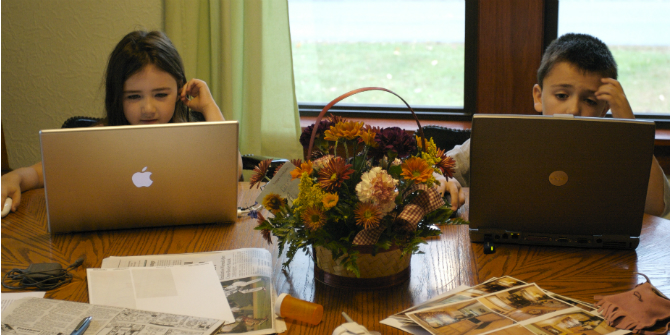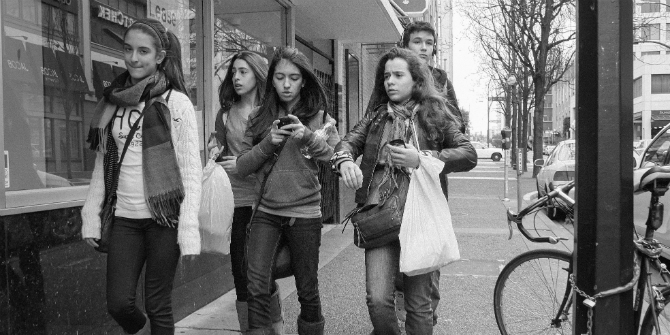 Julian Sefton-Green and Sonia Livingstone spent one year with a class of 13 year olds – at school, at home, with their friends, and online. Their book about this research project, The Class: living and learning in the digital age, is one of two debuting the MacArthur Foundation’s “Connected Youth and Digital Futures” book series. It is free to read online. Julian is an independent scholar working in education and the cultural and creative industries. He is currently leading the project Preparing for Creative Labour and is a principal research fellow at the Department of Media & Communication, LSE, a research associate at the University of Oslo and visiting professor at The Playful Learning Centre, University of Helsinki. [Header image credit: C.C. Chapman, CC BY-NC-ND 2.0]
Julian Sefton-Green and Sonia Livingstone spent one year with a class of 13 year olds – at school, at home, with their friends, and online. Their book about this research project, The Class: living and learning in the digital age, is one of two debuting the MacArthur Foundation’s “Connected Youth and Digital Futures” book series. It is free to read online. Julian is an independent scholar working in education and the cultural and creative industries. He is currently leading the project Preparing for Creative Labour and is a principal research fellow at the Department of Media & Communication, LSE, a research associate at the University of Oslo and visiting professor at The Playful Learning Centre, University of Helsinki. [Header image credit: C.C. Chapman, CC BY-NC-ND 2.0]
Building on research supported by the MacArthur Foundation’s Digital Media and Learning initiative, a new series “Connected Youth and Digital Futures,” is debuting its first two books — By Any Media Necessary: The New Activism of American Youth and The Class: Living and Learning in the Digital Age. This series offers books that describe the ways that the day-to-day lives and futures of young people are being reconfigured at the intersection of civil and political reform, transformation in employment and education and the penetration of digital technologies across all domains of social and personal life.
Why a new book series?
We live in divisive and divided times where the futures that young people may inherit appear more fraught than in previous generations. As Western societies have become increasingly marketized, older forms of social contract — of conformity, working hard and aspiring high — can no longer fullfil the promises they appeared to offer. Access to employment, housing and independent living has become increasingly competitive, and generations are being lost from participation in conventional forms of civic activity and political action. Social life is increasingly mediated through forms of digital technology and the interpersonal and day-to-day life in neighborhoods and communities have become increasingly surveilled and automated. Traditional state institutions like schools and colleges seem more peripheral and excluding; and life pathways confused, complex and competitive. Forms of social stratification seem to have become more acute as elites have reasserted their power and privilege. All of these changes call into question the nature and purpose of learning in these uncertain times.
Whilst debates about many of these themes have been around for some time, they are frequently encountered as forms of abstraction and hypothesis. The hallmark of this series will be rigorous and accessible empirical research that engages with complex theory in new and generative ways. Many of the claims advanced for the digital are now being tested around the world as institutions and young people themselves negotiate, incorporate or transform in response to these changing possibilities. This series will play a key role in understanding this “second generation” debate and research.
Key themes include:
- the relationship between new forms of “institution” as the traditional “places” of education, community, civics and employment transform and morph into virtual practices;
- the agency of young people themselves as they seek to make sense of the disjuncture between expectations about the future and the opportunities afforded by these new spaces; and
- the changing nature of learning processes, spaces and places and the spread of informal education.
The original project of cultural studies placed youth and education at the center of its ambition as it began the process of theorizing the work of power, resistance and social change. This series will address these concerns with original studies and responsive theories capable of making sense of the new routes and trajectories being explored by young people themselves.
New York University Press and Open Access
Books in the series are published by New York University Press and we are working with them in a new kind of partnership. Typically, academic books are pretty expensive and are expected to pay for themselves usually because of the way that university libraries will purchase copies; and most academic presses are keen for their products to be used on courses to ensure high sales. This has two important implications. First, publishers tend to want books that in some ways will feed into the way that teaching and learning is currently organized so a series interested in learning but not necessarily in schools or civic life nor politics is always going to be challenging. Secondly, the DML Research Hub has worked for nearly 10 years to create an unusual constituency or even a community of educators and practitioners who work in a variety of settings — from schools and universities to youth-centered, community-based organizations and businesses to online — and, this community has created a new market.
To reach such a variety of readers and possible audiences, the book series will be available, free in online formats. There will be print books and e-books but also an open-access version using a customized Readium platform. Books will be available across a variety of platforms and devices. Readers will be able to share, tweet and post from these volumes (possibly at the level of sentences or paragraphs) in order to make the reading process a more collaborative and social experience. This technology should certainly help turn our books into the day-to-day activity of community interaction. The technology also means that media and online references and connections should flow far more naturally from these new digital texts then they might from their print versions.
This is all slightly experimental. We don’t know if readers will want to read whole volumes online in this way and we don’t know if the books will spur comment and dialogue. We hope they will; and Google analytics may tell us the answers to these questions. We don’t know if being free and open access will mean we will sell more or fewer copies. Academics and scholars are always being urged to make their work relevant and useful and so, we are also interested in whether these new and changing forms of reading will have an influence on the ideas and research we are trying to promote and circulate.
New York University Press is an ideal partner for this venture. Known for its well-presented and high-quality publications, the press was interested in working with DML not simply to produce these volumes but also to partner with us in order to explore ways of making academic books more accessible, relevant and purposeful as well as helping them find a place in new and emerging communities.
Why a book?
The first set of volumes in the series have their roots in research supported by the MacArthur Foundation and the DML Research Hub. We hope that over time, more scholars will want to send their work to us even if they haven’t been directly funded as part of the connected learning or Youth and Participatory Politics networks. However these volumes reach us, a number of people in the wider network have questioned what the point of scholarly books might be. In the context of practitioner-led reform, a highly organized and institutionalized system of schooling, which seems rather impervious to change all over the world, the limited effect of scholarship and debate in society, we think this is a question worthwhile asking and answering.
First of all, we know that in some ways, argument and findings can be well disseminated in non-book form. Blogs, opinion pieces, articles, interviews and talks all get the ideas out there while it takes a long time to write a book. Secondly, what sort of people read scholarly works? Yes, we know books are read by our peers, researchers and students but, do they get to policy-makers, politicians or other important social actors?
When MacArthur’s DML initiative put together its research agenda, it placed considerable resources — not exclusively so — into forms of research and it is also supporting this book series. There seem to be two things at play in the production of this kind of academic knowledge. First, there is a question of status and authority. The very slowness of academic work is often because getting review, responding to criticism and attending to detail all take time (whatever readers might think of any individual university professor’s efficiency or work-rate) and this is because, on the whole, scholars are careful and considered in their contributions. Even in a society as fast and as mediatized as ours, books still possess a traditional authority which can hold sway over families and politicians alike.
A book — as opposed to a blog or an article — is a form of extended narrative which allows for a level of detail and depth which can’t be found in other ways that we make sense of society. Similarly, for all their pedantry, footnotes and references situate this narrative in long-term enquiries and investigations. Both of the first volumes in the series rely on forms of ethnographic enquiry, where the authors have spent time revisiting social practices and describing them in ways that best explain the deeper trends and themes going on.
We think a book series is a good way to give weight and history to a subject like digital media and learning, which all too often tends to be imagined, something that only exists in the here and now. In fact, as both these first two volumes explain, digital media is very much part of the texture of everyday life and builds on pre-digital understandings of the world rather than reinvents anew. We also think that depth and quality of the research captured in these volumes show policymakers, families, educators and young people how complicated, changeable and immovable it is to work toward giving young people a chance in a more fair or more equal society.
NOTES
This text was originally published on the DML Central blog and has been re-posted with permission.






